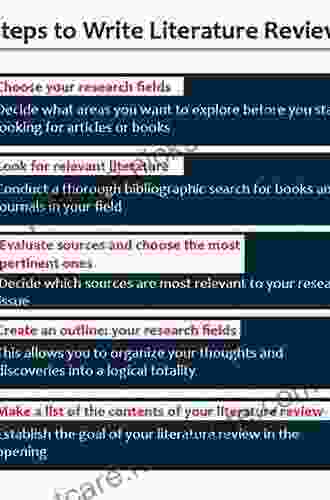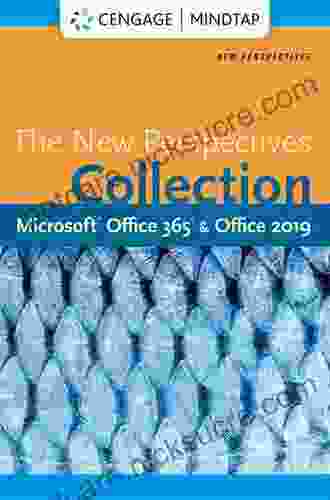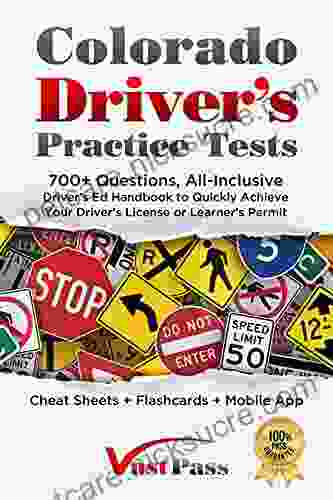How to Write an Outstanding Literature Review: A Step-by-Step Guide for Academic Excellence

Welcome to the ultimate guide on crafting an exceptional literature review, an indispensable component of academic research and scholarly writing. This comprehensive guide will empower you with the knowledge and skills necessary to navigate the intricate landscape of literature reviews, ensuring that your research stands out from the multitude with its clarity, depth, and originality.
Defining a Literature Review: The Cornerstone of Academic Research
A literature review is a systematic and critical examination of existing research, theories, and perspectives on a particular topic. It provides a comprehensive overview of the current body of knowledge on a specific subject, highlighting key findings, identifying gaps in research, and laying the foundation for further investigation.
4.1 out of 5
| Language | : | English |
| File size | : | 4021 KB |
| Text-to-Speech | : | Enabled |
| Screen Reader | : | Supported |
| Enhanced typesetting | : | Enabled |
| Print length | : | 636 pages |
In essence, a literature review:
- Summarizes and synthesizes relevant scholarly sources
- Identifies and evaluates key themes, theories, and methodologies
- Critically analyzes the strengths and limitations of existing research
- Positions your research within the broader academic context
Step 1: The Foundation – Understanding the Purpose and Scope
Before embarking on your literature review, it is crucial to define your objectives and establish the scope of your search. Begin by clearly articulating your research question or hypothesis. This serves as the guiding principle for your literature search and analysis.
Once your research question is defined, establish the parameters of your search. Consider the relevant time frame, geographical boundaries, and types of sources that will be included in your review.
Step 2: Embarking on a Comprehensive Literature Search
With your objectives and scope defined, it's time to delve into the vast realm of academic literature. Utilize a systematic approach to identify relevant sources, leveraging research databases, scholarly journals, books, and conference proceedings.
Employ keywords and search terms derived from your research question to optimize your search results. Refine your search strategy by incorporating Boolean operators (AND, OR, NOT) and using quotation marks for exact phrases.
Step 3: Critically Appraising the Literature: A Discerning Eye
As you gather sources, it is essential to critically evaluate each one to ensure its relevance, credibility, and scholarly rigor. Consider the following criteria:
- Author's credentials: Assess the author's expertise and reputation in the field.
- Publication venue: Determine the credibility and reputation of the journal or publisher.
- Methodology: Examine the soundness of the research design and methods used.
- Findings: Evaluate the reliability and significance of the study's results.
- Currency: Consider the recency of the publication to ensure it reflects current research.
Step 4: Organizing and Synthesizing: Creating a Cohesive Narrative
With your sources gathered and critically evaluated, it's time to synthesize the information into a coherent narrative. Organize your literature review logically, typically following a thematic or chronological structure.
Summarize the key findings of each study, highlighting its strengths and limitations. Identify common themes and patterns that emerge from the literature. Analyze and interpret the collective findings, drawing connections and identifying gaps in knowledge.
Step 5: Writing with Clarity and Precision
Your literature review should be written in a clear, concise, and engaging style. Use precise language and avoid jargon or technical terms that may alienate your audience. Cite all sources meticulously, following established academic guidelines.
Proofread your work carefully to ensure accuracy, consistency, and flow. Seek feedback from peers or mentors to gain valuable insights and improve the overall quality of your writing.
Step 6: Academic Integrity: Maintaining Ethical Standards
Academic integrity is paramount in any scholarly endeavor. When writing your literature review, ensure that you:
- Acknowledge all sources and avoid plagiarism.
- Use quotation marks for direct quotations and paraphrase ideas accurately.
- Maintain transparency in your writing and avoid misrepresentation of findings.
- Adhere to the ethical guidelines of your institution and the field.
: Enhancing Your Research Prowess
Crafting an exceptional literature review is a cornerstone of academic excellence. By following the steps outlined in this comprehensive guide, you will be well-equipped to conduct a thorough literature search, critically evaluate sources, synthesize information effectively, and present your findings in a compelling and scholarly manner.
Remember, a well-written literature review not only demonstrates your mastery of the subject matter but also lays the groundwork for further research and exploration. Embrace this guide as your compass on your journey to academic success and produce literature reviews that will leave an indelible mark.
4.1 out of 5
| Language | : | English |
| File size | : | 4021 KB |
| Text-to-Speech | : | Enabled |
| Screen Reader | : | Supported |
| Enhanced typesetting | : | Enabled |
| Print length | : | 636 pages |
Do you want to contribute by writing guest posts on this blog?
Please contact us and send us a resume of previous articles that you have written.
 Fiction
Fiction Non Fiction
Non Fiction Romance
Romance Mystery
Mystery Thriller
Thriller SciFi
SciFi Fantasy
Fantasy Horror
Horror Biography
Biography Selfhelp
Selfhelp Business
Business History
History Classics
Classics Poetry
Poetry Childrens
Childrens Young Adult
Young Adult Educational
Educational Cooking
Cooking Travel
Travel Lifestyle
Lifestyle Spirituality
Spirituality Health
Health Fitness
Fitness Technology
Technology Science
Science Arts
Arts Crafts
Crafts DIY
DIY Gardening
Gardening Petcare
Petcare Christine E Sleeter
Christine E Sleeter Belinia Xenrale
Belinia Xenrale Egerton Ryerson Young
Egerton Ryerson Young Os Guinness
Os Guinness Lei Wang
Lei Wang Amanda Claridge
Amanda Claridge Bruce Brown
Bruce Brown Janice K Ledford
Janice K Ledford Tim Powers
Tim Powers Gary M Schultheis
Gary M Schultheis Derek Rowntree
Derek Rowntree Deborah Spungen
Deborah Spungen Harry Fisch
Harry Fisch Brian Fagan
Brian Fagan David Wolff
David Wolff Ronald York
Ronald York Doug Degrood
Doug Degrood Mark Vee John
Mark Vee John Isa Herrera
Isa Herrera Ben Coates
Ben Coates Steve Garratt
Steve Garratt Michael Ross
Michael Ross Diana Papaioannou
Diana Papaioannou David Kahn
David Kahn Lavinia Collins
Lavinia Collins Samuel Owedyk
Samuel Owedyk Jamil Zaki
Jamil Zaki Michael Clarke
Michael Clarke Felicia Pizzonia
Felicia Pizzonia Jacob Stegenga
Jacob Stegenga Derald Wing Sue
Derald Wing Sue Lenora Chu
Lenora Chu Jeanne Oliver
Jeanne Oliver Alan Agresti
Alan Agresti Dana Trentini
Dana Trentini Natalia Molina
Natalia Molina Aaron T Beck
Aaron T Beck S K Gupta
S K Gupta Chris Stringer
Chris Stringer Robert Lomas
Robert Lomas Charlotte Eliopoulos
Charlotte Eliopoulos Forrest Willett
Forrest Willett Anton Angelov
Anton Angelov Wolfgang Jank
Wolfgang Jank Latham Thomas
Latham Thomas Deborah T Goldberg
Deborah T Goldberg Duncan Hamilton
Duncan Hamilton Vikas Bhushan
Vikas Bhushan Mara Rutherford
Mara Rutherford Paul Annacone
Paul Annacone Paul Freedman
Paul Freedman Timothy Dickeson
Timothy Dickeson Frank Wilczek
Frank Wilczek Julie Angus
Julie Angus Rollo Tomassi
Rollo Tomassi Andrea Sfiligoi
Andrea Sfiligoi Gill Stewart
Gill Stewart Saroo Brierley
Saroo Brierley Joyce L Vedral
Joyce L Vedral Linda L French
Linda L French Adam Cesare
Adam Cesare Marva Collins
Marva Collins Helen Batten
Helen Batten Nathan D Lang Raad
Nathan D Lang Raad Hesam Nemounehkhah
Hesam Nemounehkhah Sarah A Reinhard
Sarah A Reinhard Steve Crawford
Steve Crawford R I Chalmers
R I Chalmers J F Tamayo
J F Tamayo Evelyn Raab
Evelyn Raab Pam Jarvis
Pam Jarvis Larry A Yff
Larry A Yff Keshia A Case
Keshia A Case Scott Matthews
Scott Matthews Ukay J Ekong
Ukay J Ekong Robert Lanza
Robert Lanza David Weber
David Weber Sarah Thompson
Sarah Thompson Lech A Grzelak
Lech A Grzelak My Daily German
My Daily German Jeremy Lent
Jeremy Lent Gary E Schwartz
Gary E Schwartz Jay Cassell
Jay Cassell Zachary Willey
Zachary Willey Aron Ralston
Aron Ralston Lou Nanne
Lou Nanne Webb Chiles
Webb Chiles Janet Malcolm
Janet Malcolm Wendy Sullivan
Wendy Sullivan Brian Meier
Brian Meier Laura Luther
Laura Luther Taylor Fontenot
Taylor Fontenot Cal Peternell
Cal Peternell James Proctor
James Proctor Judith Warner
Judith Warner David Fine
David Fine Grace Liu
Grace Liu Terry Pratchett
Terry Pratchett Jason Sumner
Jason Sumner Philip Coppens
Philip Coppens Naomi Moriyama
Naomi Moriyama Nick Redfern
Nick Redfern Kay Kennedy
Kay Kennedy Lori Bregman
Lori Bregman Nicholas J Saunders
Nicholas J Saunders Christopher Hook
Christopher Hook Gerd Gigerenzer
Gerd Gigerenzer Tim Deroche
Tim Deroche Timothy R Pauketat
Timothy R Pauketat Susan Ludington Hoe
Susan Ludington Hoe Jon Young
Jon Young Evy Poumpouras
Evy Poumpouras David Faulkner
David Faulkner Jacob Cohen
Jacob Cohen Heather A Smith
Heather A Smith James Ragonnet
James Ragonnet Jerome Rand
Jerome Rand Tadahiko Mizuno
Tadahiko Mizuno Anthony Burgess
Anthony Burgess Amanda Kingloff
Amanda Kingloff Ian Stewart
Ian Stewart Asti Hustvedt
Asti Hustvedt Chad Waterbury
Chad Waterbury Teri Tom
Teri Tom Wendy Higgins
Wendy Higgins Stephen R Lawhead
Stephen R Lawhead Patricia B Mcconnell
Patricia B Mcconnell Ellie Marney
Ellie Marney Shalini Shankar
Shalini Shankar Diane H Tracey
Diane H Tracey M L Buchman
M L Buchman Gary Dierking
Gary Dierking Kristen Thrasher
Kristen Thrasher Jo Bartlett
Jo Bartlett Michelle Damiani
Michelle Damiani 15th Edition Kindle Edition
15th Edition Kindle Edition Perre Coleman Magness
Perre Coleman Magness Holly Hook
Holly Hook Ivor Horton
Ivor Horton Lawrence T Friedhoff
Lawrence T Friedhoff Richard E Nisbett
Richard E Nisbett Janet Godwin
Janet Godwin Monica Beyer
Monica Beyer Jack Newfield
Jack Newfield Andrew Evans
Andrew Evans Adeline Yen Mah
Adeline Yen Mah S Elia
S Elia Ben Rothenberg
Ben Rothenberg Sarah Lawton
Sarah Lawton Jareth Tempest
Jareth Tempest Paul Johnson
Paul Johnson Kathleen Buckstaff
Kathleen Buckstaff Christa Mackinnon
Christa Mackinnon Beryl Beare
Beryl Beare Wabun Wind
Wabun Wind Peter Heller
Peter Heller Broccoli Lion
Broccoli Lion Joshua G Shifrin
Joshua G Shifrin Sharon Wilkins
Sharon Wilkins Ric Conrad
Ric Conrad Ann Olga Koloski Ostrow
Ann Olga Koloski Ostrow Michele Smith
Michele Smith Knowledge Tree
Knowledge Tree Jacqueline Carey
Jacqueline Carey John Toussaint
John Toussaint Anthony Haynes
Anthony Haynes Anne Polli
Anne Polli M Susan Lindee
M Susan Lindee 1st Ed 2020 Edition Kindle Edition
1st Ed 2020 Edition Kindle Edition Jeremy Bhandari
Jeremy Bhandari Nancy B Rapoport
Nancy B Rapoport Alison Gopnik
Alison Gopnik David Roberts
David Roberts Claire Dunn
Claire Dunn Karina Manta
Karina Manta Ashlee Kasten
Ashlee Kasten Teddy Atlas
Teddy Atlas 6th Edition Kindle Edition
6th Edition Kindle Edition Intelligent
Intelligent Raichelle Carter
Raichelle Carter Vaclav Smil
Vaclav Smil Robert Chu
Robert Chu Samantha Boardman
Samantha Boardman Pam Vredevelt
Pam Vredevelt Yaron Seidman
Yaron Seidman Andrew Solomon
Andrew Solomon Edward A Bell
Edward A Bell Harvey Penick
Harvey Penick Julie K Briggs
Julie K Briggs Florence Nightingale
Florence Nightingale Mayim Bialik
Mayim Bialik Alice Roberts
Alice Roberts Nicole Zasowski
Nicole Zasowski Kaoru Sinozaki
Kaoru Sinozaki Livy
Livy Suzy Hopkins
Suzy Hopkins Emily Chetkowski
Emily Chetkowski Bradmd
Bradmd Marisa Kanter
Marisa Kanter Michael T Mcdermott
Michael T Mcdermott Philip Moore
Philip Moore Jeffrey S Saltz
Jeffrey S Saltz Dierdre Wolownick Honnold
Dierdre Wolownick Honnold Christopher Carter
Christopher Carter Stacey Steinberg
Stacey Steinberg Mae Ilami Onyekwum
Mae Ilami Onyekwum Rachael Bell Irving
Rachael Bell Irving Jeff Benedict
Jeff Benedict Adam Rutherford Phd
Adam Rutherford Phd Alex Hibbert
Alex Hibbert Jean Yves Leloup
Jean Yves Leloup Clark A Campbell
Clark A Campbell Roger Frampton
Roger Frampton Mike Barrett
Mike Barrett Craig Clapper
Craig Clapper James M Tabor
James M Tabor Cathy Raubenheimer
Cathy Raubenheimer Fletcher Dunn
Fletcher Dunn 1st Ed 2021 Edition Kindle Edition
1st Ed 2021 Edition Kindle Edition Richard Hofstadter
Richard Hofstadter Felicity Cloake
Felicity Cloake George Mount
George Mount Chris J Ellis
Chris J Ellis Amita Jassi
Amita Jassi Hannu Rajaniemi
Hannu Rajaniemi Ray Mcnulty
Ray Mcnulty Shane Benzie
Shane Benzie Elaine Heney
Elaine Heney Daisaku Ikeda
Daisaku Ikeda Janice Hudson
Janice Hudson Michael Archer
Michael Archer Bob Chandler
Bob Chandler Paul Haddad
Paul Haddad Tillie Cole
Tillie Cole Diane Vaughan
Diane Vaughan Stephen Bodio
Stephen Bodio Pete Magill
Pete Magill Leslie Anthony
Leslie Anthony Launi Meili
Launi Meili Glenda Green
Glenda Green Monte Burch
Monte Burch Xiufeng Liu
Xiufeng Liu Piotr Naskrecki
Piotr Naskrecki Day Schildkret
Day Schildkret Leona S Aiken
Leona S Aiken Maureen Dempsey
Maureen Dempsey Kev Reynolds
Kev Reynolds The Lodge Company
The Lodge Company Alison Pray
Alison Pray Michael Schiavone
Michael Schiavone Karen L Cox
Karen L Cox Edward Marston
Edward Marston Desiree Trattles
Desiree Trattles Christian Fader
Christian Fader Elizabeth Field
Elizabeth Field Nancy Hendrickson
Nancy Hendrickson Daniel Todd Gilbert
Daniel Todd Gilbert Rosemary Ellen Guiley
Rosemary Ellen Guiley Six Sisters Stuff
Six Sisters Stuff Leonie Mack
Leonie Mack Emily Vikre
Emily Vikre Hafsah Faizal
Hafsah Faizal Nageshwar Sah
Nageshwar Sah Ruth Ware
Ruth Ware Jamie Dorobek
Jamie Dorobek Jacqueline Corricelli
Jacqueline Corricelli Liz Thomas
Liz Thomas Traci Chee
Traci Chee Editions La Plume D Eros
Editions La Plume D Eros Julia Rutland
Julia Rutland Matthew Dworak
Matthew Dworak Rafael Nadal
Rafael Nadal Darril Fosty
Darril Fosty Lisa Marasco
Lisa Marasco Mark Miller
Mark Miller Joshua Darwin
Joshua Darwin Katie Singer
Katie Singer Lh Press
Lh Press Raymond Arsenault
Raymond Arsenault Jamie Whyte
Jamie Whyte Botros Rizk
Botros Rizk Russ Moorhouse
Russ Moorhouse Bob Allcorn
Bob Allcorn Robert Milner
Robert Milner Valerie Nash Chang
Valerie Nash Chang Erfun Geula
Erfun Geula Jacob Gardner
Jacob Gardner John T Cacioppo
John T Cacioppo Ejike Ifeanyichukwu
Ejike Ifeanyichukwu Lynne Tolley
Lynne Tolley Robyn Ryle
Robyn Ryle Sean Fitz Gerald
Sean Fitz Gerald Bud Hasert
Bud Hasert Louise Warneford
Louise Warneford Lars Anderson
Lars Anderson Keith Bowden
Keith Bowden Lani Forbes
Lani Forbes Jim Baggott
Jim Baggott Jill Heinerth
Jill Heinerth Arny Alberts
Arny Alberts Erin Miller
Erin Miller Bryn Huntpalmer
Bryn Huntpalmer Karen Kovacs
Karen Kovacs 1st Ed 2016 Edition Kindle Edition
1st Ed 2016 Edition Kindle Edition Maia Motley
Maia Motley Dr Mike Grevlos
Dr Mike Grevlos Lisa R Cohen
Lisa R Cohen Dorthe Berntsen
Dorthe Berntsen Irina Szmelskyj
Irina Szmelskyj James Adams
James Adams Alexandre Paiva
Alexandre Paiva H Lee Jones
H Lee Jones Rebekah Dodson
Rebekah Dodson David Barrett
David Barrett Chris Parsons
Chris Parsons Peter Burns
Peter Burns John L Havlin
John L Havlin Leonard Sax
Leonard Sax John Vigor
John Vigor Carola Hein
Carola Hein Kim Dwinell
Kim Dwinell Raven Morgaine
Raven Morgaine Dinah Bucholz
Dinah Bucholz Larry Kaniut
Larry Kaniut Clifford E Trafzer
Clifford E Trafzer Denis Dwyer
Denis Dwyer Phyllis Franklin
Phyllis Franklin Charles Fleming
Charles Fleming Loudell F Snow
Loudell F Snow Mike Bender
Mike Bender Jane Yeadon
Jane Yeadon Orji Onyebuchi
Orji Onyebuchi Alice Waters
Alice Waters Daniel H Pink
Daniel H Pink Berkshire K Greene
Berkshire K Greene Sophie Kinsella
Sophie Kinsella 1st Edition Kindle Edition
1st Edition Kindle Edition Barry Ord Clarke
Barry Ord Clarke Phil Mickelson
Phil Mickelson Susan Alcorn
Susan Alcorn Tyler Lansford
Tyler Lansford Lindsey Bliss
Lindsey Bliss Mildred Council
Mildred Council Kajal Gupta
Kajal Gupta Sally A Lipsky
Sally A Lipsky Ashley Stanford
Ashley Stanford Robyn Perry Worthington
Robyn Perry Worthington 1st Ed 2019 Edition Kindle Edition
1st Ed 2019 Edition Kindle Edition Rick Barba
Rick Barba Elise Hennessy
Elise Hennessy Bill Rodgers
Bill Rodgers Larry Krieger
Larry Krieger Dk Publishing
Dk Publishing Paul A Laviolette
Paul A Laviolette Joseph Mercola
Joseph Mercola Pat Manley
Pat Manley Kathy Farrokhzad
Kathy Farrokhzad Mambo Chita Tann
Mambo Chita Tann Carmen Acevedo Butcher
Carmen Acevedo Butcher Jay Carter
Jay Carter Daniel L Schacter
Daniel L Schacter 1st Ed 2018 Edition Kindle Edition
1st Ed 2018 Edition Kindle Edition Tim Hollister
Tim Hollister Brent Warner
Brent Warner Burt L Standish
Burt L Standish John Small
John Small Ewan Mcgregor
Ewan Mcgregor Disha Experts
Disha Experts Hana Ali
Hana Ali Caroline Fidanza
Caroline Fidanza Tom Chivers
Tom Chivers Mark Lattanzi
Mark Lattanzi Ian Sample
Ian Sample Kim Mack Rosenberg
Kim Mack Rosenberg Peter Hessler
Peter Hessler Mike Lanza
Mike Lanza Amanda Brooks
Amanda Brooks Mark Santino
Mark Santino Morten H Christiansen
Morten H Christiansen Stephen C Meyer
Stephen C Meyer Ron Larson
Ron Larson Jean Pierre De Caussade
Jean Pierre De Caussade Francis L Macrina
Francis L Macrina Helen Garabedian
Helen Garabedian Andrea Olson
Andrea Olson Andy Kirkpatrick
Andy Kirkpatrick Patricia G Lange
Patricia G Lange Mary Douglas
Mary Douglas Seth Tucker
Seth Tucker Jandy Nelson
Jandy Nelson Mike Chappell
Mike Chappell Bilingual Edition Kindle Edition
Bilingual Edition Kindle Edition Guy Harrison
Guy Harrison Randall M Packard
Randall M Packard Megan Sloan
Megan Sloan Dylan Dethier
Dylan Dethier Travis Senzaki
Travis Senzaki Alexandra Witze
Alexandra Witze Sandra Uwiringiyimana
Sandra Uwiringiyimana Manjit Kumar
Manjit Kumar Sanjay Sarma
Sanjay Sarma Alan Greenfield
Alan Greenfield Sarah A Clark
Sarah A Clark Nick Morrison
Nick Morrison Fern Nichols
Fern Nichols Arden Rose
Arden Rose Taran Matharu
Taran Matharu David I Spivak
David I Spivak Rana Conway
Rana Conway Rebecca Solnit
Rebecca Solnit Brent E Turvey
Brent E Turvey D James Benton
D James Benton Kara Goucher
Kara Goucher Mark Seidenberg
Mark Seidenberg Joan Ryan
Joan Ryan Richard Pears
Richard Pears T M Mikita
T M Mikita Modestus Anabaraonye
Modestus Anabaraonye Didier Reiss
Didier Reiss Shane Jones
Shane Jones Philippa Langley
Philippa Langley Carol Lynn Mckibben
Carol Lynn Mckibben Sara Saedi
Sara Saedi Chip Ingram
Chip Ingram Christian Straube
Christian Straube Paul Gaskell
Paul Gaskell R K Agarwal
R K Agarwal Joshua James
Joshua James Rachel Reed
Rachel Reed Ivana Bajic Hajdukovic
Ivana Bajic Hajdukovic 1st Ed 2017 Edition Kindle Edition
1st Ed 2017 Edition Kindle Edition Robert Oerter
Robert Oerter Kiley Reid
Kiley Reid Tamonya Sands
Tamonya Sands Sara Snow
Sara Snow Estelle Maskame
Estelle Maskame Geoff Powter
Geoff Powter Michael Borenstein
Michael Borenstein Dan Robson
Dan Robson David Clark
David Clark Jonathan Vaughters
Jonathan Vaughters Guillermo Gonzalez
Guillermo Gonzalez Alexandra Kenin
Alexandra Kenin Alan Naldrett
Alan Naldrett Irene Spencer
Irene Spencer Karyn Garvin
Karyn Garvin Spire Study System
Spire Study System Graham Priest
Graham Priest Will Nett
Will Nett Peter Lightbown
Peter Lightbown Daniel Scott
Daniel Scott Robyn Hawkins
Robyn Hawkins Ann Jackson
Ann Jackson Gail Buckland
Gail Buckland Jesse M Ehrenfeld
Jesse M Ehrenfeld Bruce Chatwin
Bruce Chatwin Jonathan Tarbox
Jonathan Tarbox Sharon Copeland
Sharon Copeland George Grimm
George Grimm Cathy Hester Seckman
Cathy Hester Seckman House Of Talent
House Of Talent Eryk Lewinson
Eryk Lewinson Eric Sevareid
Eric Sevareid Stanley Vast
Stanley Vast Matthew B Crawford
Matthew B Crawford Thomas Lickona
Thomas Lickona Kyler Shumway
Kyler Shumway Jody Morse
Jody Morse Brad Myers
Brad Myers Norman Delgado
Norman Delgado Robert Irwin
Robert Irwin Otto Toeplitz
Otto Toeplitz John S Farnam
John S Farnam Robert Clifton Robinson
Robert Clifton Robinson Robin Hobb
Robin Hobb Geoff Johns
Geoff Johns R J Vickers
R J Vickers Mindfulness Hypnosis Academy
Mindfulness Hypnosis Academy Harold Simmons
Harold Simmons Karl Rehn
Karl Rehn Elizabeth Becker
Elizabeth Becker Matthew Harffy
Matthew Harffy Nicole Libin Phd
Nicole Libin Phd Skylar Kergil
Skylar Kergil Neil Sagebiel
Neil Sagebiel Michael R Canfield
Michael R Canfield Franz Boas
Franz Boas Gerald Beaudry
Gerald Beaudry Carol Matsuzaki
Carol Matsuzaki Ali Psiuk
Ali Psiuk Natsuki Takaya
Natsuki Takaya Joanne Calderwood
Joanne Calderwood William E Glassley
William E Glassley Geraint Thomas
Geraint Thomas Laura Prepon
Laura Prepon Bill Douglas
Bill Douglas Elizabeth Heavey
Elizabeth Heavey Joachim Rossberg
Joachim Rossberg
Light bulbAdvertise smarter! Our strategic ad space ensures maximum exposure. Reserve your spot today!

 Roland HayesClockwork Orange by Anthony Burgess: A Journey into Dystopian Violence and...
Roland HayesClockwork Orange by Anthony Burgess: A Journey into Dystopian Violence and... Paulo CoelhoFollow ·9.2k
Paulo CoelhoFollow ·9.2k Gregory WoodsFollow ·5.1k
Gregory WoodsFollow ·5.1k Vic ParkerFollow ·2k
Vic ParkerFollow ·2k Adam HayesFollow ·11.8k
Adam HayesFollow ·11.8k Cristian CoxFollow ·19.3k
Cristian CoxFollow ·19.3k Samuel BeckettFollow ·5.8k
Samuel BeckettFollow ·5.8k Vernon BlairFollow ·12k
Vernon BlairFollow ·12k Julio CortázarFollow ·16.8k
Julio CortázarFollow ·16.8k
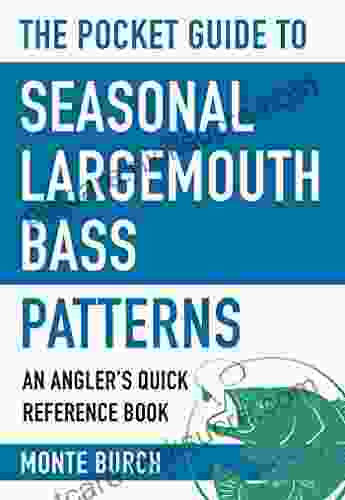
 Marcus Bell
Marcus BellThe Essential Guide to Angler Quick Reference: Your...
Embark on an unforgettable...
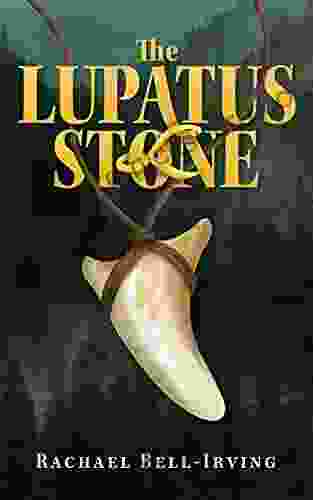
 Juan Butler
Juan ButlerThe Lupatus Stone: A Wicked Conjuring
The Lupatus Stone is a...

 Alvin Bell
Alvin BellUnveiling the Enchanting Memoirs of Lady Hyegyong: A...
In the annals of Korean...

 DeShawn Powell
DeShawn PowellAMC's Best Day Hikes in the Berkshires: Explore Majestic...
The Berkshires, a...
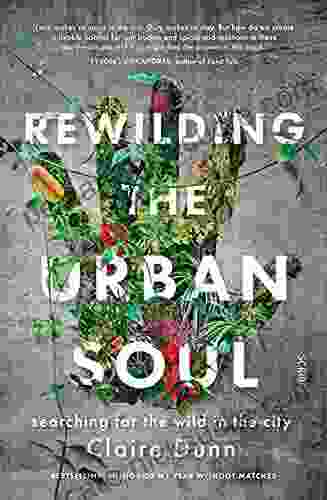
 Clark Campbell
Clark CampbellRewilding The Urban Soul: Reconnecting with Nature in the...
In the heart of sprawling metropolises, where...

 Cruz Simmons
Cruz SimmonsHow to Find Your Family History on a Genealogy Website: A...
Delving into the...
4.1 out of 5
| Language | : | English |
| File size | : | 4021 KB |
| Text-to-Speech | : | Enabled |
| Screen Reader | : | Supported |
| Enhanced typesetting | : | Enabled |
| Print length | : | 636 pages |


